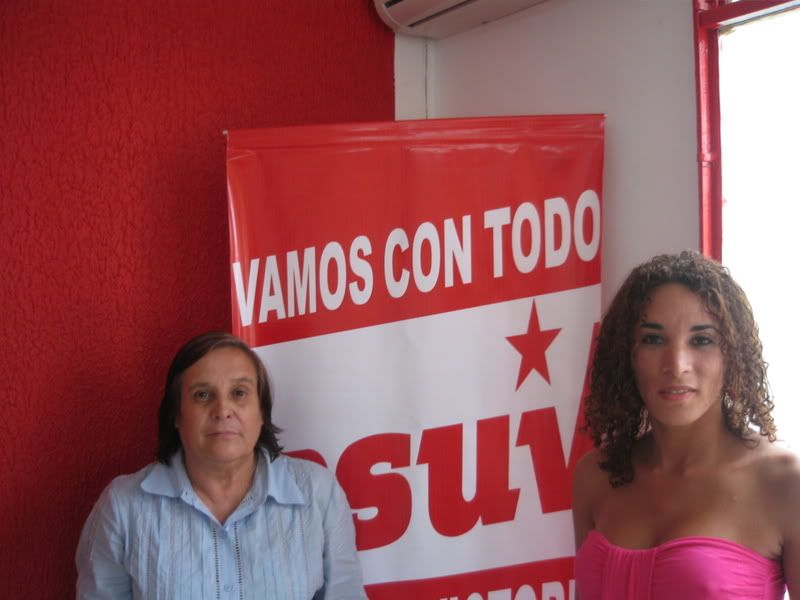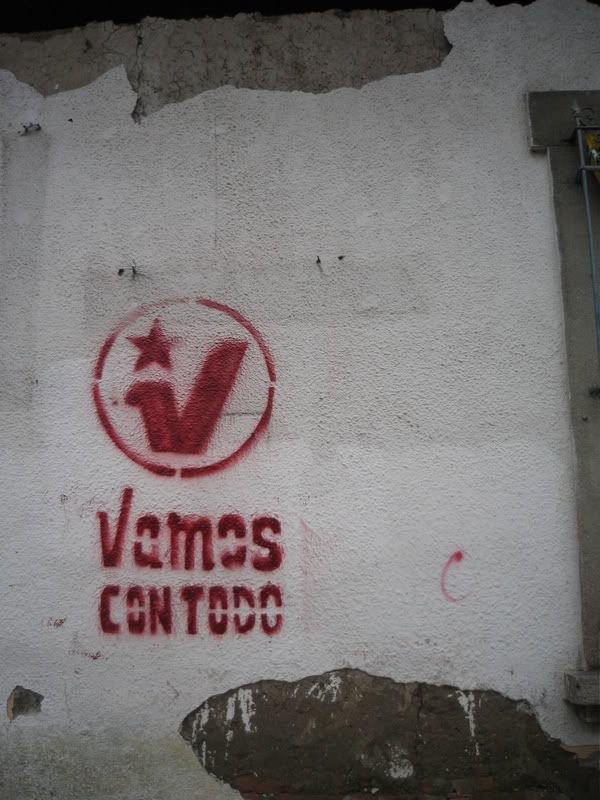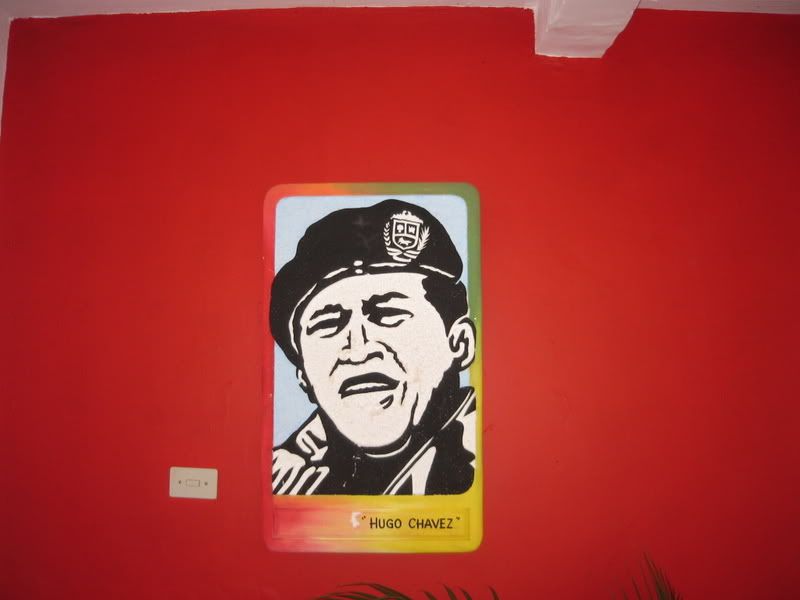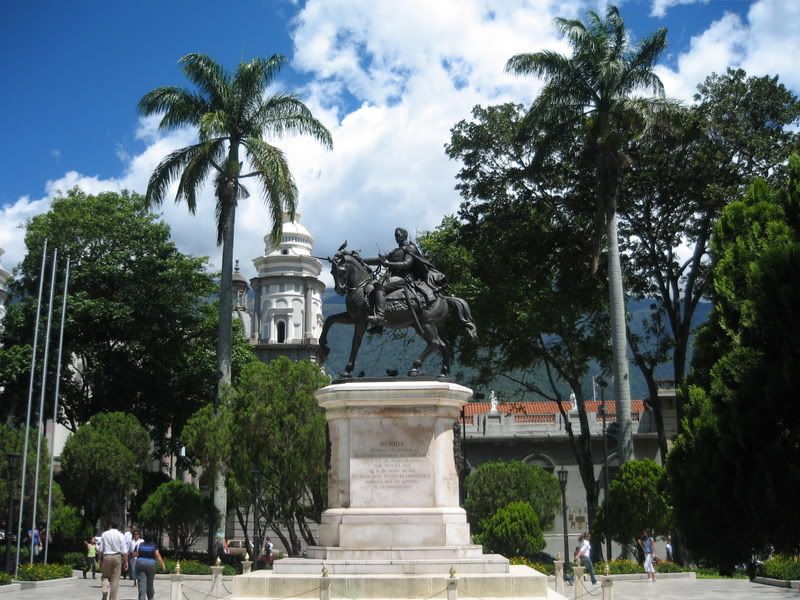Canadian socialist Jeffery R. Webber interviews women leaders of PSUV in the state of Mérida.
 Teresa Mora and María Linares at the PSUV’s Mérida headquarters |
In the early afternoon of September 8, 2008, I sat down at the state headquarters of the United Socialist Party of Venezuela (PSUV), in the city of Mérida, for an animated interview with Lizardy Prada, Teresa Mora, and María Linares, elected members of the party’s Coordinating Commission for the State of Mérida. That they engaged with me for an hour immediately following a roughly five-hour long party meeting is some indication in itself of the important conjuncture Venezuela is passing through, and the prevailing level of politicization and commitment. Unfortunately, Lizardy Prada had to leave part way through the interview which is why she’s not featured in the photo, and why there are no comments from her to the final questions.
JRW: Can you start by giving your names and positions in the party?
TM: Teresa Mora, member of the Regional Political Coordination of the PSUV in the state of Mérida.
JRW: How did you become a political activist?
TM: We’ve being doing this work for all our lives, during this whole epoch of the governments of the fourth republic, wrongly referred to as democratic.1 We made a commitment then, and began political work in the communities, in the streets, building this opposition of the Left that we maintained at a national level in the entire country. And then, when comandante Chávez came, we made a commitment with him, as an alternative: a man with an advanced political vision of socialism. From that time we’ve engaged in political work, in solidarity with the President.
And when the President decided to take the leap to build a party with a socialist platform, with principles and an ideology, there we were to support him.
We were elected from the grassroots. This grassroots is comprised of the socialist battalions that constitute the principal initial structures of PSUV. And from there we became members of the Political Bureau of the Regional Coordination. This happened through an election. In the case of Mérida, the only state in the country to do so, the Political Bureau was elected by the 60 members of the Regional Coordination. It was a demonstration of democracy and participation. So here we are, in this bastion of the struggle, assuming the revolutionary commitment for the consolidation of socialism.
We’re fighting so that our political work, in reality, consolidates the bases of the ideology of the party. And so that new bases are formed in the new generation, we are working with the youth, and the battalions, so that they constitute a great front of youth, so that they come to constitute this new generation.
LP: Lizardy Prada, member of the Regional Coordination of the PSUV in Mérida. With this energy that comes from working in a united fashion, we have been building patrols and socialist brigades. All of this so that November 23 will be a triumph for the Bolivarian Revolutionary Process in Venezuela.2
We are following the lines established by our maximal leader, Comandante Hugo Rafael Chávez Frías. We are working arduously, elbow to elbow, with the people: with the communitarian bases, in which the communal councils help to build this solidarity support, as do the socialist battalions.
The communal councils diagnose the situation, and struggle so that public works which the community needs will be established, that the necessities of the community will find an answer. We are involved in all of this as well, as part of the socialist battalions, united in providing this answer for the people.
In this sense, we are also working with the social sectors, responding in various ways to the social necessities of our communities.
We have various sectors, like the Lawyers’ Front, the Union of Housekeepers of the State of Mérida, the Bolivarian Force of Women, a conglomeration of social forces that struggle for what our President is going to establish in the future: that is, the united platform of women, a singular conglomeration to advocate for the Bolivarian Revolutionary Process.
In this sense we are involved in the social struggle. There are numerous necessities. There are many problems that we still need to solve. But the idea is to keep moving, knocking on doors, touching every heart, because Chávez is also love.
We are determined to bring the Bolivarian process to this culmination on November 23, in the gubernatorial elections, with the candidates of PSUV, who are the candidates with Chávez.
ML: My name is María Linares, and I am also a member of the Regional Coordination of PSUV in our state of Mérida, a state that has always supported our comandante Hugo Rafael Chávez Frías. Myself and my comrades here have decided to give this interview, as the political team, so that the Canadian people, and the Latin American people, know the truth, the reality, of the political situation of our state. Mérida is for a revolutionary socialist government. On November 23 Mérida is going to give massive support to our candidate for governor, Marcos Díaz Orellana, to support the continuation of this process that the people decided on, that the people brought to life.
We say that the revolution is going to continue, a revolution of change. When the President initiated it, when he rose up, he wasn’t in it for himself.3 He’s our comrade. We see in him a person who is bringing change to Venezuela. If the opposition wins, it’s going to be a complete failure.
Our mission is the participation of the most marginalized, our peasants, our Women’s Front, our children, so that they have the opportunity to integrate themselves into this process. Before we were totally excluded people in our own country. The project of this President is a project of inclusion.
We are calling out to all our women comrades and compatriots, because this is a process of inclusion, a revolution of change. This is a process in which the President, through his platform, and his Sunday TV program Aló Presidente, has outlined what is happening in this country, the changes and achievements.
The people need to wake up, and on November 23, in the state of Mérida, in the capital, we are going to say that we continue with our comandante Hugo Rafael Chávez Frías.
JRW: What have been the most important achievements since 1998?
LP: We have had various achievements, but above all else are the missions. We have Mission Barrio Adentro, in the area of health. This is very important, because the Mission Barrio Adentro has attended to various aspects of health, as well as helping people who couldn’t see. We also have the Mission Sonrisa, which is involved in providing dental services. These have all been delivered without charge, and it’s worthwhile to emphasize this fact, because before the people never had access to any of these services.
We also have high-tech centers, where there are magnetic resonance services, tomography, and laboratory exams. Before, a peasant would never have had access to these parts of the health sector. High levels of mortality were common before, because there was no access to these types of high-tech services.
In terms of education, our missions have reduced illiteracy. We have Mission Robinson, Mission Ribas, and Mission Sucre, at the primary, secondary, and university levels respectively.
We have also achieved other things related to improving people’s dignity, particularly in the area of social security, established in Article 88 of the Constitution. At this very moment they’re working on laws to improve social security in the National Assembly. This will include social security for women and men who work in their homes, as well as for people with disabilities.
This is a large sector of our population, above all women who work at home. Women who have been cleaning, ironing, cooking, and raising kids, and who have never been able to have access to a fixed job. They were excluded from social security. But now we have these decrees, and the new law that is in its first discussion in parliament, and which we will soon bring before sessions of street parliament (parliamentarismo de calles) so that all the people will know about it and understand it.
So the social part of this President’s administration has been a great achievement for all citizens.
We also made changes in the agricultural sector.
And we’ve made strides in the participation of women, not only at the political level, but at the social level. And it has to be recognized that none of this existed before, that is equality between genders. Women are in the struggle.
Another important aspect of the achievements has to do with housing, something that has a huge effect on the people. Through our giant petroleum industry we have financed what we call “petro houses” (petro casas). We’ve signed agreements [with people without homes] to support them and to help them achieve dignity. These are dignified houses, not matchbox houses, so that families can be comfortable. So we are using PDVSA [the state oil company] to cover these expenses.
We are also using this money to finance the subsidization of food markets. One of the major strategies of this president is to establish food security, bringing food to the people. Many times it is said [by the opposition] there’s no food. This is false. We are building cooperative food markets that are bringing food to the people at solidarity prices, reasonable prices. And not only in the case of vegetables, but also for meat, fish, chicken, all of the products of the basic food basket, are now accessible for everyone.
TM: One of the successes in the area of health that has transcended the borders of Venezuela has been the Latin American Institute of Children’s [inaudible]. Our comandante has begun building a center that will treat children, not only from Venezuela, but children from other countries in Latin America as well, which is why it’s called the Latin American institute. The center will attend to children with some of the most delicate problems, children who have heart conditions. In Venezuela there was never a place where these problems could be attended to, and thus thousands of children died each year. Only because they lacked an institution that could help them. Now, thanks to our comandante, we have such an institution, which will not only attend to the children but will also support their families who have to travel from the interior of the country to receive this medical attention.
 PSUV graffiti in Mérida |
JRW: From your perspective, has the formation of PSUV been a success? What are the strengths and weaknesses that characterize the party today?
ML: As everyone knows, we come from the grassroots. And now we have introduced a change, that is, the construction of the United Socialist Party of Venezuela (PSUV). This has resulted in the situation that all of those people who were involved in the process were able to become a part of this new party, which reflects the complexity of our country. The PSUV has integrated all those comrades and people who, in one way or another, were discontent. This is a new party that we are starting to continue with the achievements of the process.
At the national level the PSUV has [inaudible]. We hope that all the comrades will join the party, a party that is committed to furthering the Bolivarian Revolutionary Process in our country.
 Hugo Chávez wall hanging in the offices of PSUV in Mérida |
TM: You asked about the strengths and weaknesses of the party. To begin with the strengths, one is to have a leader the caliber of our comandante Hugo Chávez, an international leader who has made Venezuelan known, in spite of the difficulties standing in the way of getting the story out about what’s happening in Venezuela. He has done this in the other countries of Latin America, and at the international level. He has done so from the premise of socialism and revolution. We have been able to form a party that is going to be the example in Latin America, that is going to be the example at the international level. A party of structure and political organization that transcends borders as it follows its ideological lines.
Weaknesses, yes, I believe that we have many weaknesses. But in spite of these weaknesses, we are overcoming them with our qualities, with our will, with our political commitment that will transcend whatever situation presents itself.
Therefore, we must emphasize that we have this great leader, that we have this great man Hugo Chávez. And we have a party that depends on us, on our work, and our commitment. This party will be able to provide results, provide benefits, and shape our structure and political ideology. It’s an important bastion of struggle for everyone.
JRW: What does Twenty-First Century Socialism mean for you?
TM: This is a new socialism, with an ideological conception that is distinct from those socialisms that were symbiotic with Communism many years ago. They really were not successful, and they did not respond to the needs and the unique demands of their communities. Rather they thought of socialism as a general universal model.
I understand that when our President talks about socialism for the twenty-first century, he’s talking about a very Venezuelan socialism. It emerges from the necessities, from the sense of collectivity, from the humility of the people, from these deprivations that have been manifesting themselves here for so long.
From this point of view, with an advanced ideological conception, we will be able to build this type of country, and form this type of thinking, as we are doing.
Socialism of the twenty-first century obeys these ideas. There have been many criticisms of the President, many things have been said. But it must be recognized that this is a Venezuelan conceptualization of socialism, a Latin American conceptualization, responding to all the deprivations that are characteristic of the region.
This is what has raised the question, why we are talking about socialism.
And we are talking about a Christian socialism, which many believe is an impossibility, that when you talk about socialism, you have to be an atheist, you can’t believe in God.
But our President has talked about the existence of God, and how Christ was an example of solidarity. So Christ also exists within this ideological formation, to validate it, and fuse it with socialism. A socialism with faith, a socialism that recognizes the different religious inclinations that the people have. But a socialism that insists that what needs to be kept in mind is that the most important thing is solidarity.
 Simon Bolívar in the central plaza of Mérida |
It’s the solidarity that Christ advocated for, the kind of solidarity that our liberator Simon Bolívar advocated for, the kind of solidarity that is recognized in the agreements and affirmations of our teacher Simón Rodríguez. It’s the solidarity of our heroes. Our Che Guevara, our Fidel Castro, and our Venezuelan leaders. The solidarity that has been practiced and brought to life by the most humble, the poorest people. Within this sector is where this socialism must begin to function, which will allow for social equality, a higher level of social security, and a higher level of happiness.
JRW: What advances have women experienced within this process in terms of political participation?
TM: Marvelous question and you have the proof. Here you are with three women! Three fighting, warrior women. Look, when the Constituent Assembly was proposed [in 1999], we had representation as women in the Constituent Assembly. And real representation, democratic, participatory, and protagonistic. So in the new constitution women are represented. They are protagonists in this new constitution.
In all of the struggles women have obtained a big space. And you can see, in the cabinet of this government, there’s a large number of women, a large number of fighting women. The same is true of the National Assembly, in the Supreme Court, in the leaderships of the party, everywhere. Why? Because our President has recognized the need to revindicate the theme of gender, the theme of women. It’s no longer just men, as it was before. Now its women and men. In the constitution it now says men and women, niños y niñas [the masculine and feminine of “children”], representatives of the male sex and the female sex.
There’s a new capacity for women to decide and to lead. And as a note of defense, and a demonstration of what women are and can be, we point to our great heroínas [female form of heroes]. There’s the great heroína who was very important alongside our liberator, Manuelita Saénz.4 Many have criticized her. Our Venezuelan clergy has pushed her off to the side. I’m not saying the church, I’m talking about the clergy, and the bishops. The highest leaders of the church have tried to sanction her, to push her off to one side.
We have so many women that were examples for us, and today we are assuming this role. And we are working so that here there is true equality.
The defense of the family. Women are distinguished for their defense of our families, for the defense of our homes.
We are struggling for revindication, so that women who work in the home, the most humble women, as comrade Lizardy said, have a protagonistic role, that they are revindicated, and that their many necessities are met, that the suffering they have endured ends.
So it’s true that our comandante has been a great defender of women. He is a man who has recognized what women are really capable of, and the value that we have.
ML: I’d like to emphasize what comrade Teresa has just said. Women who work in the home, us humble women, are no longer just working in our homes. We are heroínas, as my comrade just said. We are involved at different levels of leadership, in various organizations. Women are no longer isolated. On the one hand, men used to think that only men had the capacity to take on these tasks. Our comandante, our President, has given us the opportunity to be women with aspirations, to become mayors, congresspeople, all the way up to having aspirations of becoming president of the republic.
The comandante has given us this opportunity, has recognized our value, value that we’ve had for so many years, but that went unrecognized. We were excluded.
JRW: Many thanks for this interview, and revolutionary salutations on behalf of Canadian socialists.
TM: Good, a salute to all these revolutionaries, from the United States, from Canada, and all the countries of America, from the North, to the Centre, to the South. Thanks to all these revolutionaries, and here in Venezuela you have your second home. We are here to collaborate with you. And hopefully this work that you’re doing will be for the benefit of everyone. Many thanks, and a big hug to all of these peoples. That we continue moving forward, that we continue trying to consolidate our revolution at the continental level.
ML: I would also like to say that Venezuela is an example. And we invite people to come, so that you can learn about Venezuela in a different way than is shown in the media. Come to our country, and get a sense of the reality that doesn’t exist in the media. Your media tries to distort information about what is actually going on in our country. So come, and see the reality, visit the countryside and the barrios [the poor neighbourhoods]. Get a sense that, yes, there is socialism here, and we are going to have socialism immediately, comrade.
1 The “fourth republic” is the pejorative term that Chavistas use to describe the post-1958 era of elitist “pacted democracy,” or the arranged sharing of power between the ideologically indistinguishable AD and COPEI parties.
2 There will be gubernatorial and municipal elections across Venezuela on November 23, 2008.
3 It’s not exactly clear what is being referred to here, but Chávez was involved in a failed coup attempt in 1992. The coup attempt was a reaction both to then-President Carlos Andrés Pérez’s imposition of neoliberalism after running on a campaign of anti-neoliberalism and, more importantly, the massive military and police repression that led to the deaths of between 300 and 3000 people after riots and protests broke out against the neoliberal adjustment package in 1989. Those events are known as the Caracazo, after the capital city of Caracas, but in fact extended throughout the country. Andrés Pérez was and is hated for his role in the repression, and this partially explains the popularity of the 1992 coup attempt. Chávez was released from jail after four years and successfully ran for President in 1998.
4 Manuelita Saénz was, among other things, the mistress of Simón Bolívar.
Jeffery R. Webber is a Canadian socialist who writes frequently on Latin American affairs. He’s currently in Venezuela.
